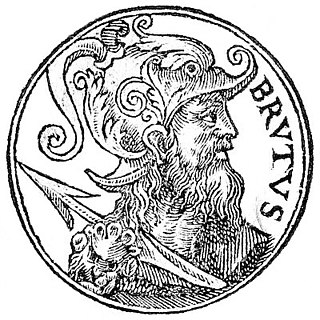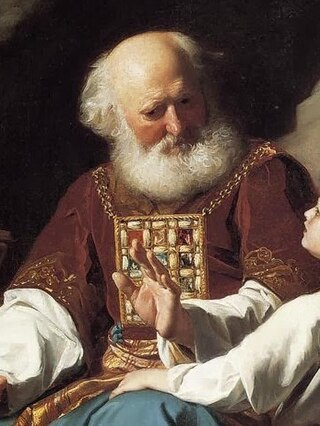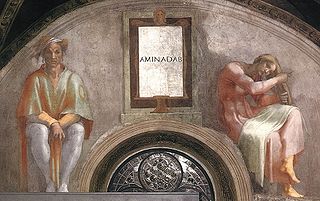Ahitub may refer to the following people in the Bible:

According to the Biblical narrative, Zerubbabel was a governor of the Achaemenid Empire's province of Yehud and the grandson of Jeconiah, penultimate king of Judah. Zerubbabel led the first group of Jews, numbering 42,360, who returned from the Babylonian captivity in the first year of Cyrus the Great, the king of the Achaemenid Empire. The date is generally thought to have been between 538 and 520 BC. Zerubbabel also laid the foundation of the Second Temple in Jerusalem soon after.
Uzzi is a given name. One derivation is biblical, from Uzzî meaning "my strength". The name can also be transliterated as Uzi. It may be a nickname for Uzza/Uzzah, Uzzia/Uzziah, and Uziel/Uzziel.

Brutus, also called Brute of Troy, is a mythical British king. He is described as a legendary descendant of the Trojan hero Aeneas, known in medieval British legend as the eponymous founder and first king of Britain. This legend first appears in the Historia Brittonum, an anonymous 9th-century historical compilation to which commentary was added by Nennius, but is best known from the account given by the 12th-century chronicler Geoffrey of Monmouth in his Historia Regum Britanniae.

Eli was, according to the Book of Samuel, a priest and a judge of the Israelites in the city of Shiloh, ancient Israel. When Hannah came to Shiloh to pray for a son, Eli initially accused her of drunkenness, but when she protested her innocence, Eli wished her well. Hannah's eventual child, Samuel, was raised by Eli in the tabernacle. When Eli failed to rein in the abusive behavior of his own sons, God promised to punish his family, which resulted in the death of Eli's sons at the Battle of Aphek where the Ark of the Covenant was also captured. When Eli heard the news of the captured Ark, he fell from his seat, broke his neck, and died. Later biblical passages mention the fortunes of several of Eli's descendants.

Zadok, also spelled Ṣadok, Ṣadoc, Zadoq, Tzadok or Tsadoq, was a Kohen (priest), biblically recorded to be a descendant of Eleazar the son of Aaron. He was the High Priest of Israel during the reigns of David and Solomon as kings of Israel. He aided King David during the revolt of his son Absalom, was subsequently instrumental in bringing Solomon to the throne, and officiated at Solomon's coronation. After Solomon's building of the First Temple in Jerusalem, Zadok was the first High Priest to serve there.
Hilkiah was a Kohen or Israelite priest at the time of King Josiah.

Enos or Enosh is a figure in the Book of Genesis in the Hebrew Bible. He is described as the first son of Seth who figures in the Generations of Adam, and is also referred to within the genealogies of 1 Chronicles.

According to the Hebrew Bible, Phinehas was a priest during the Israelites' Exodus journey. The grandson of Aaron and son of Eleazar, the High Priests, he distinguished himself as a youth at Shittim with his zeal against the heresy of Peor.

Seder Olam Zutta is an anonymous chronicle from 803 CE, called "Zuta" to distinguish it from the older Seder Olam Rabbah. This work is based upon, and to a certain extent completes and continues, the older aforementioned chronicle. It consists of two main parts: the first, comprising about three-fifths of the whole, deals with the chronology of the 50 generations from Adam to Jehoiakim, the second deals with 39 generations of exilarchs, beginning with Jehoiachin and going until the 9th century CE.

Amminadab is a minor character referred to in the Book of Exodus. He is the father-in-law of High Priest Aaron, brother of Moses.
Johanan, son of Joiada, was the fifth High Priest of the Temple in Jerusalem after it was rebuilt after the end of the Babylonian captivity. His reign is estimated to have been from c. 410–371 BCE; he was succeeded by his son Jaddua. The Hebrew Bible gives no details about his life. Johanan lived in the province of Yehud Medinata in the Achaemenid Empire during the reigns of emperors Darius II and his son Artaxerxes II.
Eliashib the High Priest is mentioned in Nehemiah 12:10,22 and 3:1, 20-21,13:28 and possibly the Book of Ezra of the Hebrew Bible as (grand)father of the high priest Johanan. Some also place him in different parts of Nehemiah including 12:23 and 13:4,7, but this is disputed. Nehemiah 3:20-21 places his home between the area of two working groups constructing the walls of Jerusalem on the south side of the city. He helped with the refortification of this wall. The size of his house indicated his wealth and high socio-economic status. This places him as someone who lived during the time of Nehemiah. In the year 445 BCE, Eliashib was the high priest when Nehemiah returned to Jerusalem in the 20th year of Artaxerxes I.
In Bible prophecy, several verses relate to the future of the Davidic line. Christians argue that Jesus fulfills these prophecies, while skeptics and Jews disagree.
Adaiah was the name of eight individuals mentioned in the Hebrew Bible. The name means "Yahweh passes by."
- Adaiah, the father of Queen Jedidah. He was of Boscath, a town in the Kingdom of Judah mentioned in the Hebrew Scriptures. His grandson was king Josiah of Israel.
- An Adaiah mentioned in passing as the ancestor of a Levite named Asaph, in 1 Chronicles 6:41.
- An Adaiah mentioned in 1 Chronicles 8:21 as being the son of a Shimei in a Benjamite genealogy.
- A priest listed in 1 Chronicles 9:12 and Nehemiah 11:12. According to Cheyne and Black, it is possible that this same priest should appear in Nehemiah 12:6 or 7, but has been removed by a scribal error that left the name "Jedaiah" in its place.
- A descendant of Bani, listed in Ezra 10:29.
- Another descendant of Bani, listed in Ezra 10:39.
- An Adaiah, son of Joiarib, listed in Nehemiah 11:5.
- An Adaiah mentioned as being the father of Maaseiah in 2 Chronicles 23:1.
Bukki may have been an early High Priest of Israel. Another Bukki is mentioned in Numbers as a leader in the Tribe of Dan.

Azor, according to a New Testament gospel narrative in Matthew 1:13 and 1:14, was an ancestor of Jesus. He is mentioned as the son of Eliakim and the great-grandson of Zerubbabel; he is the father of Zadok. By this account he is of the Davidic line.









